Like many top orchestra and opera conductors, Carolyn Watson began her career on “the other side of the baton.” Having excelled as a young violinist in her native Australia, she studied at the Sydney Conservatorium of Music and spent several years as an orchestral violinist, in her homeland and later in Europe. Returning to Australia, she found herself increasingly involved with conducting, chiefly with youth orchestras at first, and she discovered that she had a knack for it. “I was still very active as a violinist at that time, and conducting was just a hobby. But I really enjoyed working with young musicians.”
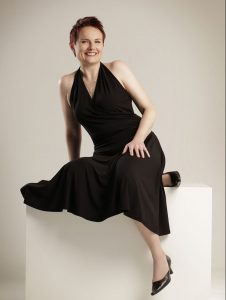
Carolyn Watson
What originally started as an effort to “improve my skills and learn a little bit more about music” became a new artistic challenge. Carolyn would later pursue a master’s degree and earn a Ph.D. in conducting from the University of Sydney, where she was a student of Hungarian conductor Imre Palló.
Yet even then, she said, “I had no intention of pursing conducting professionally,” adding with a laugh: “I guess I didn’t want to ‘break up’ with the violin.”
Carolyn is currently principal guest conductor of the Kansas City Chamber Orchestra, a frequent guest with the Lyric Opera and Kansas City Ballet, and music director of the La Porte County Symphony Orchestra in Indiana.
Just as important, she also holds one of the most prestigious academic posts in the nation: as director of orchestras at the University of Illinois at Urbana-Champaign, where she is part of a new generation of women striving to transform a traditionally male-dominated profession. And much work remains to be done.
She has won a series of international prizes, including the Sir Charles Mackerras Conducting Prize, multiple prizes at the Emmerich Kálmán International Operetta Conducting Competition, a Churchill Fellowship, and the Brian Stacey Award for Emerging Australian conductors. She studied with David Zinman and others as a Fellow of the American Academy of Conducting in Aspen, where she began to believe there might be a career for her in America.
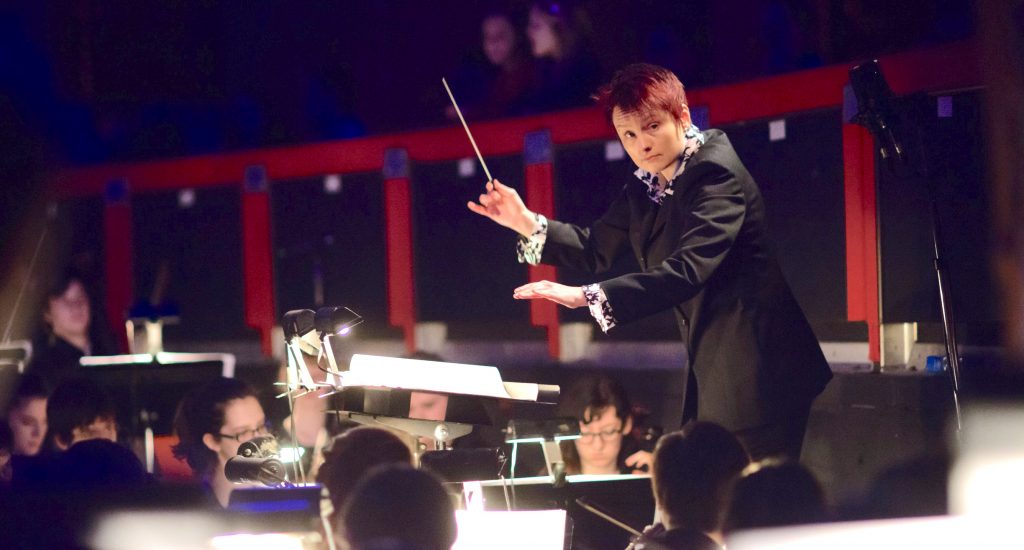
Carolyn Watson conducts students at Interlochen Arts Academy in Michigan in 2014. / Photo by Brian Powers
Carolyn came to the United States in 2013, initially to assume the post as Director of the Interlochen Arts Academy Orchestra. She now leads a busy career guest-conducting throughout America, Europe, and Australia. Among her notable achievements was participating in Interaktion featuring musicians of the Berlin Philharmonic, a residency at the Israeli National Opera, and assisting the late Sir Charles Mackerras on his final two productions at Covent Garden and Glyndebourne.
In 2016 and 2017, Carolyn participated in Dallas Opera’s Hart Institute for Women Conductors, during which she led Dallas Opera in two public performances. It was there that she began to look back on her career and notice how few women she had seen along the way. “I had an epiphany moment when I realized I had been the only woman in my conducting class in Sydney, and in Aspen there were only two of us, and in the Kálmán Competition in Budapest I was the only woman. And I thought, Oh my goodness, how did I not see this before?”
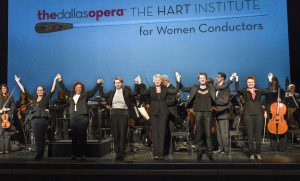
The 2017 participants of the Hart Institute included Lina Gonzalez-Granados, Alba Bomfim, Monika Wolinska, Karin Hendrickson, Mélisse Brunet, and Carolyn Watson. / Photo by Karen Almond
The Dallas program was important in advancing Carolyn’s career, as it has been for a number of up-and-coming women. “The experience and the conducting and the teaching and the training and the mentoring are all absolutely first-rate,” she said. Just as important is the program’s devotion to “showing how the business of conducting actually works, … how to navigate the profession and how to forge connections with the right people.”
As in many professions, “there’s a lot of ‘gatekeeping’ in classical music generally, and in conducting in particular. People are fortunately now recognizing that this has presented barriers to those who were not male and white in the past. And as a result of this conversation, I feel there is a greater awareness to re-evaluate established practices, and to perhaps do things differently going forward.”
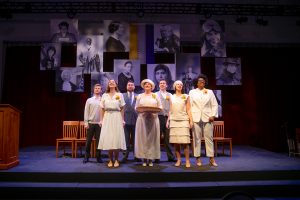
Carolyn conducted the Lyric Opera’s 2020 production of …When There Are Nine…, which featured Thomas Drew, Kelly Birch, Robert H. Riordan, Kelli Van Meter, Joseph Leppek, Morgan Balfour, and Eboni Fondren. / Photo by Brian Paulette
While it is true that conservatories and music schools have a larger percentage of women studying conducting than even 10 years ago, this swell has been slow to affect hiring practices. Among the top 50 American orchestras, only four have women at the helm, according to the International Conference of Symphony and Opera Musicians. And among the top-tier orchestras, only one is led by a woman: the Atlanta Symphony, where Nathalie Stutzmann became music director this season.
There are signs of progress: Just in the past five years or so, several orchestras have hired women and/or BIPOC musicians, though largely for assistant or associate conductor positions. It is too early to say that equity in top-tier posts will be achieved any time soon: Careers in conducting “take notoriously long to develop,” Carolyn said. “It will likely take many more years before the people entering the profession now will get the opportunity to succeed at the elite level.”
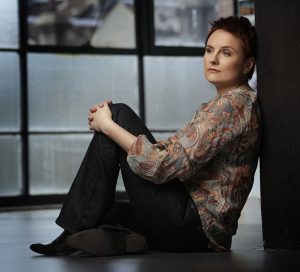 Happily, Kansas Citians are able to experience Carolyn on the podium on a frequent basis. In December, she led several performances of the Kansas City Ballet’s The Nutcracker, and this season she has led two of the Kansas City Chamber Orchestra’s concerts. At the Lyric Opera she conducted High Fidelity Opera, Penelope, and …When There Are Nine…, and this April 15th and 16th, she leads the Lyric’s production of the family opera Listen, Wilhelmina!
Happily, Kansas Citians are able to experience Carolyn on the podium on a frequent basis. In December, she led several performances of the Kansas City Ballet’s The Nutcracker, and this season she has led two of the Kansas City Chamber Orchestra’s concerts. At the Lyric Opera she conducted High Fidelity Opera, Penelope, and …When There Are Nine…, and this April 15th and 16th, she leads the Lyric’s production of the family opera Listen, Wilhelmina!
Conducting and teaching continue to be sources of great personal satisfaction. “I like working with people, that’s why I got into conducting. It’s a massive challenge, of course, but conducting is always a privilege and an honor. … It’s fundamentally a ‘service’ role, a collaboration: You’re always part of something bigger than yourself, so it’s always humbling., as well as a great deal of responsibility. I guess I like being a facilitator, and helping ‘connect the dots’ as it were.”
For tickets to the Lyric Opera call 816-471-7344 or visit kcopera.org. For Chamber Orchestra tickets, see kcchamberorchestra.org, and for more on Carolyn, see carolyn-watson.com or visit her Instagram at @carolynconducts.
—By Paul Horsley
To reach Paul Horsley, performing arts editor, send an email to paul@kcindependent.com or find him on Facebook (paul.horsley.501) or Twitter/Instagram (@phorsleycritic).